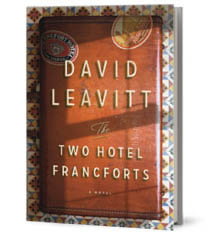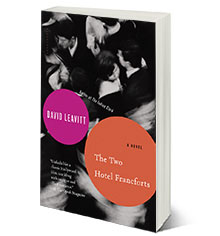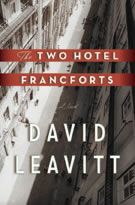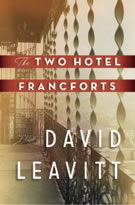Novel
THE TWO HOTEL FRANCFORTS
BLOOMSBURY, 2013
It is the summer of 1940, and Lisbon, Portugal, is the only neutral port left in Europe—a city filled with spies, crowned heads, and refugees of every nationality, tipping back absinthe to while away the time until their escape. Awaiting safe passage to New York on the SS Manhattan, two couples meet: Pete and Julia Winters, expatriate Americans fleeing their sedate life in Paris; and Edward and Iris Freleng, sophisticated, independently wealthy, bohemian, and beset by the social and sexual anxieties of their class. As Portugal’s neutrality, and the world’s future, hang in the balance, the hidden threads in the lives of these four characters—Julia’s status as a Jew, Pete and Edward’s improbable affair, Iris’s increasingly desperate efforts to save her tenuous marriage—begin to come loose. This journey will change their lives irrevocably, as Europe sinks into war.
BUY Amazon barnes & noble indiebound
ON The Two Hotel Francforts
In Reading for the Plot, Peter Brooks writes of ‘the anticipation of retrospection’—the way that, as we read, we are already thinking of how we will look back on a book once we've finished. Similarly, Frank Kermode said in The Sense of an Ending that novels (and lives) anticipate their own endings, making ‘possible a satisfying consonance with the origins and with the middle.’ The ending of The Two Hotel Francforts is utterly unpredictable and quite brilliant, changing our conception of the whole novel over the course of 25 scintillating pages. Leavitt, through his narrator, Peter, presents us with a series of fragments—a passage from a detective novel written à quatre mains by Edward and his wife, Iris; the wartime memoir of Julia's adventurous aunt; a listicle of novel-writing tips with accompanying critique from the author. By the time we reach the final, heroic paragraphs, we come to realise that The Two Hotel Francforts isn't a historical novel at all. Rather, it's a self-interrogation, a book about how to write historical novels...We leave Lisbon breathless and utterly dazzled…The Two Hotel Francforts should establish him again as one of the major voices of contemporary fiction. Moving, ravishing and fiercely ambitious, this is a novel to treasure.
—Alex Preston, The Guardian
…a deftly executed piece of literary historical fiction. In neutral Lisbon in 1940, two expatriate couples find themselves awaiting passage to America among a cauldron of desperate refugees fleeing the Nazi advance. This marvelously dramatic setting—Casablanca by way of Graham Greene—is the backdrop for a story related in retrospect by Pete Winters. He’s an earnest Midwestern auto salesman who at first believes that ‘most people are exactly what they appear to be,’ but the novel’s dramatic arc will trace his education and eventual disillusionment. The progressively sinister web of deceit and manipulation that Leavitt constructs echoes Henry James’s intricate tales of Americans undone abroad.
—Michael Lindgren, The Washington Post
Much of the important action in The Two Hotel Francforts (there were two of that name in Lisbon at that time; the Winters are staying in one and the Frelengs in the other) takes place off stage in the conversations between Iris and Julia while their husbands walk and drive around the city looking for places to pursue their affair. Yet Leavitt paces his narrative with masterly skill, and carefully doles out the truth about his characters to keep you turning the pages. His story is set against meticulously researched details of the plight of refugees in a country that was supposedly neutral, yet unquestionably on the Nazi side, and illuminates a little remembered episode of the Second World War. As the ship for America arrives you expect Pete to accept one of the two fates that now seem open to him. However, he has learnt at last to see clearly. He pulls away from his narrative to explain how he has broken all the rules a novice writer should follow, before revealing the surprising end to his story. Leavitt too has taken the daring risk of leaving the introduction of a key character until almost the final pages. That he pulls it off is testament to the pleasures of a novel, that although played in a minor key, is never quite what it seems and never fails to intrigue.
—Paul Dunn, The Times
Set in Lisbon in the summer of 1940, a time when the capital is teeming with expats fleeing the war, this charged psycho-sexual drama is centered upon two couples, each awaiting safe passage back to America and each domiciled in one of the city’s two Hotel Francforts…it’s no coincidence that the Frelengs pen detective yarns since the author, like the best crime writers, knows exactly how to direct our gaze to ensure that we end up wrong-footed. Written in finely-honed prose and brief, elegant chapters, this evocative and atmospheric novel awakens us to our own expectations even as its characters’ eyes are opened.
—Stephanie Cross, The Daily Mail
Portugal’s neutrality during the Second World War made it a refuge for exiles and expatriates from all over Europe. The influx of spies and refugees into Lisbon inspired Robert Wilson to use it as a backdrop for the thrillers A Small Death in Lisbon and The Company of Strangers. Now David Leavitt finds the city the perfect setting in which to explore domestic deceptions and marital disharmony. As Edward Freleng, one of his central characters, puts it, “Lisbon is the end of Europe…the fingertip of Europe. And everything that Europe is and means is pressed into that fingertip.”…The Two Hotel Francforts is a highly accomplished, urbane and satisfying novel.
—Michael Arditti, The Literary Review
Decoys, fake names, doubles and puzzles abound in this carefully constructed novel. I sensed Leavitt having fun with the layered intricacies of his narrative: the two hotels with the same name; the two couples with their respective and paralleled secrets; the writers of detective novels who wish to remain undetected; the player of solitaire whose solitude is slowly unravelling her…Lisbon itself is described with great precision, and the distinctive architecture of narrow streets and towering lifts, or elevadores, are vivid in our mind’s eye, a fitting symbol for the precarious relationships in which the two couples find themselves.
—Rebecca Abrams, Financial Times
Novels dealing with expatriates are often interesting because, in addition to the regular challenges that the characters face with regards to being away from home, their nationally inborn ideologies are cast in relief against those of their host nation, and stand out more starkly. PEN/Faulkner Award finalist David Leavitt’s new novel, The Two Hotel Francforts, has all of these features, with the addition of strong sexual drama. The book is built around two couples in the Portuguese city of Lisbon in 1940. Lisbon is one of the last neutral ports in Europe, and the city is crowded with people looking to escape the gathering storm. While waiting for passage to safety in New York, Americans Pete and Julia Winters meet the English Edward and Iris Freleng, and we learn of the strains being applied to the marriages, which are both stable but generally loveless. Soon, the men find themselves conducting an affair not with each other’s wives but with each other. Their liaisons would be dangerous even if they weren’t set against the backdrop of war, the threat of discovery combined with the threat of death. The book is as atmospherically evocative as Joseph Kanon’s Istanbul Passage (set in another neutral port city during the war) but it’s the affecting love story, unique in structure and told in Leavitt’s intelligent prose, that makes it worth recommending.
—Nicholas Mancusi, The Daily Beast
Spanning just a few weeks and 250 pages, The Two Hotel Francforts is a stylish model of narrative compression and economy. Despite the escalating Nazi threat that forms its backdrop, its focus is alienation of affection rather than annihilation…Leavitt's novel has some of the snap of a comedy of manners and the hard-boiled moodiness of Casablanca…Despite its wartime setting and its concern with issues of guilt and responsibility, The Two Hotel Francforts offers a bouncier read than Leavitt's previous novels, with an especially satisfying, almost jaunty ending.
—Heller McAlpin, The Christian Science Monitor
The Two Hotel Francforts has its pages packed with all that a reader could hope for in terms of a well-constructed, perfectly-realized tale. It is the first novel in a very long time that this reader actually stayed up late (even to the point of washing his face in cold water) in order to keep reading and find out What Happens Next. Rarer still, it is the sort of book that leaves the reader satisfied; a novel that presents an ending worthy of the story—an ending at once inevitable and surprising…The Two Hotel Francforts is a full-blown cinematic romance set against an impeccably researched representation of the crush of European refugees into the port of Lisbon early in 1940. The time, the tale, and the tempo all seem right. It is a worthy companion to anything else that David Leavitt has written in his illustrious career. Furthermore it raises the bar on most of the fiction published so far this year—both compelling and elegant—and highly recommended.
—New York Journal of Books
Set in Lisbon in the summer of 1940, The Two Hotel Francforts, David Leavitt’s lean, stylish new novel, unfurls like a classic Hollywood film, crackling with intrigue and illicit romance. One almost expects Humphrey Bogart and Ingrid Bergman to glide into view…The author of The Lost Language of Cranes employs coolly elegant prose to evoke the era’s glamour and dread…He transports the reader to a wayward world racked by historic upheaval and intimate demons.
—Hamilton Cain, O: The Oprah Magazine
Readers who crave more secrets and ambiguities in their fiction will be sated by David Leavitt's deft historical novel, The Two Hotel Francforts. Pete and Julia Winters are among the tidal wave of refugees who have fled to Lisbon in 1940 after the Nazi conquest of France. Being Americans, the two need only pass the days until a passenger ship docks to take them home. Being pampered and bored and on the outs after years of marriage, they fill that time with brittle arguments and baldfaced infidelity…As Pete and Julia struggle to uncover the other's true desires after years of seeming placidity, the story becomes unstable and fatalistic. Europe has entered free fall, and their marriage follows suit. “Descending,” Pete wryly observes, “is far more dangerous than ascending.”
—Sam Sacks, The Wall Street Journal
David Leavitt’s novel, The Two Hotel Francforts, cuts in two directions at once: It’s a refugee story with something of the atmosphere of an Alan Furst novel, and at the same time it’s the story of a brief but intense gay love affair, characteristic of Leavitt’s other gay-themed novels. Starting with the very title (the two hotels, one swanky—the other sleazy, owned by brothers who are mad at each other, with each insisting that his hotel is the legitimate Francfort—a meaningless quarrel), the book set in 1940 Lisbon proliferates with doubles and duplicities of many sorts and varieties. Leavitt handles complicated material with proficient craft, allowing gaps and unresolved questions simply to be part of the fabric. He’s confidently telling us: This is how it was for two couples sitting at the edge of the European conflagration. They are “safe” for a moment in a place where nothing makes much sense. By means of smooth prose and convincing dialogue (lots of it sounding Noel Cowardish), a reader is calmly invited to witness incongruities or absurdities. This reader, for one, is quite willing to play along. The stuff is strange but always interesting, even intriguing to read…The novel takes two very surprising sharp turns at the end, compensating for the prior lengthy, going-nowhere quality of the narrative and redeeming the aimlessness of the characters’ lives with its café sitting and visits to the demimonde. Pete does something at the end that, while not construed as noble or heroic, can be seen as something that is unequivocally good. Perhaps Pete has more in common with Bogart at the end of Casablanca than one initially might believe.
—Stefan Fleischer, The Buffalo News
Brave and risky...Leavitt is a fluent, clever writer...he has such page-turning craft that you read enthusiastically.
—The New York Times Book Review
In The Two Hotel Francforts, novelist David Leavitt (The Indian Clerk) takes his readers right to the brink: to the edge of continental Europe and a war that for many seemed like the end of civilization itself…The cobwebbed world of half-truths and lies inhabited by these characters is echoed by the shadowy setting of wartime Lisbon. Portugal’s neutrality masks the unsettling politics of the Salazar government, just as the couples’ untethered lives hide a hollow core at the center of each marriage. Like authors Graham Greene or Ford Madox Ford, Leavitt suggests that the moral ambiguities let loose during the pressures of wartime push people to extremes that they might never have reached otherwise. Leavitt’s setting may be unsavory, but his storytelling is not, with complex characters and rich details that bring the seedy hotels and crowded cafes to life. This is a brittle tale told with an effortless ease.
—Lauren Bufferd, Bookpage.com
David Leavitt’s wonderful novel The Two Hotel Francforts is, on one level, about a love affair––a hopeless, doomed, tragic, and even slightly ridiculous one—between two married men, Pete Winters and Edward Freleng. The book is also about the world in which the men live, a world lurching and capsizing during wartime, and so Pete and Edward’s confusion, passion, and jarring emotions mirror perfectly the Lisbon of 1940 they and their wives find themselves in… Leavitt’s rendering of war-unnerved Lisbon is so crisp, romantic (in the fullest sense of that word), and immediate that the novel succeeds both as a unflinching observation of love, marriage, and desire, and also as a well-researched and piercing portrait of a larger historical moment…Toward the end the book suddenly shifts to a breezy, fiction-within-fiction telling of what happens next to the characters. This feels odd, unwelcome even, but another perspective is perhaps needed to tell a key part of the story happening around Pete. Then his voice re-emerges, and in doing something wholly unexpected, Pete suddenly finds purpose. It’s a bracing ending, proving Leavitt as much a master of clarity as he is of confusion.
—Tim Teeman, Gay City News
The specter of Nazism hangs over the relational drama of Edward, Pete, Iris and Julia. Pete is surprised to find himself in a sexual relationship with Edward; Edward’s wife, Iris, tries mightily to keep her unorthodox marriage intact. Meanwhile emotionally fragile Julia—who has lived with Pete in Paris for the past fifteen years—hates the idea of returning to New York as much as she does having left Paris where “the war had at first seemed like little more than a costume party.” Leavitt’s description of the “haute-couture gas mask holders” that Vogue magazine declares is a “necessity that no sophisticated Parisienne should be with out” is particularly disturbing and emblematic of the denial of some French Jews who “regarded themselves as French first and Jewish second” and “made the mistake of assuming that France would regard them the same way”…Leavitt’s interests have often not just lain in pure storytelling, but also in the clever interplay between fiction and the reality. (The novel Martin Bauman; or, A Sure Thing comes to mind as does his novella “The Term Paper Artist.”) In The Two Hotels Francforts, Leavitt has fun with these themes. Years after the arrival of the SS Manhattan, Pete, who doesn’t think of himself as a good storyteller, revisits an article called “Ten Rules the Novice Writer Should Follow.” Pete (or is it Leavitt?) seems to have broken every item on the list, which begins with “Never set scenes of dialogues in cafés. They provide insufficient business for the characters.” Whether these rules have any validity is obviously questionable. What isn’t in doubt is that it doesn’t matter if Leavitt broke them or not. The Two Hotels Francforts stands with his very best work.
—Ken Harvey, Lambda Literary Review
Leavitt is superb at comedy of manners, his dialogue is witty and tight and his characters constantly reveal themselves while trying to keep their true feelings hidden. But the mischievous, giddy social comedy of the novel's romantic first section becomes progressively more realistic, as vacation romances do. This tale told by a car salesman of the week that changed his life is scrupulously honest, and Leavitt has never been in greater command of his talents: the genius of the set-ups, the pay-offs that generate more pay-offs, the luminous and perceptive language, the sensuous evocation of Lisbon, the re-creation of the sheer uncertainty in the face of Hitler's relentless advance. In his best work yet, Leavitt is a smart, literate American novelist in the British tradition of Iris Murdoch and E. M. Forster. The Two Hotel Francforts is a story where every sentence counts, human beings are only allowed partial truths and morality matters.
—Nick DiMartino, Shelf Awareness
When the climax to the novel comes, it is delivered most ingeniously, not by the narrator, but by a minor character, who has made only the most fleeting of appearances in the book. It’s a very clever manoeuvre and highlights the expert construction of The Two Hotel Francforts. I have read all of David Leavitt’s seven previous novels and I would emphatically rate this as one of his finest—the narrative is carried off with great wit, intelligence and distinction, the characters (both major and minor) are an intriguing bunch, and this particular moment in history is absolutely fascinating.
—Graeme Aitken
Leavitt’s (The Indian Clerk) new novel depicts a 1940 Lisbon overflowing with Axis spies and refugees fleeing France ahead of the impending German invasion, but this smart, well-crafted story is less wartime drama than a vivid depiction of husbands and wives under pressure. Expatriate Americans Pete and Julia Winters can’t stand each other–she hates Portugal and hates even more the thought of returning to the U.S. Pete, meanwhile, accepts that their marriage is just a vapor, without any substance. Edward and Iris Freleng, another American couple, are lazy mystery writers mired in their own debauchery. When these four people are thrown together, strange relationships develop as they wait to leave on the weekly ship to New York. They share drinks, meals, and much more, “too worried about what we were losing to care about those who were losing more.” One spouse is self-destructive, one is a manipulative sexual predator, a third is obsessive, and the fourth has a suppressed sense of moral purpose. And only two will leave Portugal. Leavitt’s clever, engaging tale of marriage’s hidden shadows, lies, and half-truths demonstrates that husbands and wives are only as happy as they’ve already decided to allow themselves to be.
—Publishers Weekly (starred review)
An artfully crafted story of two marriages...The book is set in Lisbon, Portugal, among the refugees, after the outbreak of World War II. Pete and Julia Winters meet Iris and Edward Freleng, and their little dog, Daisy, when Edward steps on Pete’s glasses. They are sitting outside the Café Suiça, a place packed with foreigners hoping to escape Europe. While the Winters and the Frelengs have this problem solved—they will travel on the SS Manhattan, an American ship commandeered for the purpose—they have their own problems, and little more than a week to live through them. The Winters have been living in Paris for 17 years. Julia is temperamental, high-strung; she has sworn never to return to New York. The Frelengs are independently wealthy, for many years itinerant; they have for some time been settled in the Gironde, passing the days writing Xavier Legrand mysteries. Edward is unstable; Iris is manipulative; Julia is brittle; and Pete, the narrator, is conflicted—a good man who does a bad thing for the right reasons. Along the way, there is an affair and a fatal tragedy. Very fine work.
—Kirkus Reviews
We can always count on David Leavitt to bring buried desires to the surface and give the uncertainties of an era startling clarity in his fiction. Here in his glorious new novel, with his characters on the run from war and suspended in a precarious state of exile, he traces their efforts to create meaningful lives amidst the turmoil surrounding them. The result is a book that is artful, gripping, delicate, and fierce.
—Joanna Scott
With his first novel, The Lost Language of Cranes (1986), Leavitt claimed attention as a serious fiction writer, and the publication of his first collection of short stories, Family Dancing (1984), a finalist for the National Book Critics Circle Award, alerted readers that he was to be taken as a talented writer in the short form as well. Leavitt's new novel establishes a brisk pace from page one, corresponding to the jittery atmosphere of the place and time in which it is set: the Portuguese capital of Lisbon, which, in the summer of 1940, is the only neutral port left in Europe. Refugees from the German takeover of most of the continent are gathered in Lisbon awaiting a chance to escape the war's dangers. Leavitt focuses on two married couples as they pass the tense time until an American ship, the Manhattan, will arrive to carry them and other fortunate ticket-holders to the U.S. With one of the men narrating the novel's events, recalling them from the distance of several years, we follow the couples as they wait for relief from the dangers closing in and, in the meantime, play their own game of intrigue, not on an international diplomatic level but on a personal and even more confounding level: the two wives having to deal with an affair that quickly ignites between their husbands. The result is a dramatic story that Leavitt weaves with compelling authority and empathy.
—Booklist (starred review)
Set in 1940 and there are two Hotel Francforts in Lisbon which causes much confusion among the refugees of all nationalities who drink and gossip as they wait to escape Europe from one of its last neutral ports. Pete and Julia Winters and Edward and Iris Freleng are thrown together in an uneasy friendship as they wait for the S. S. Manhattan and Pete and Edward embark on an intense affair that will have tragic consequences. This is a sublime novel that captures the mood of a continent about to be subsumed in war through the fate of the human flotsam and jetsam caught in its tide.
—The Bookseller (UK)
The main “characters” of this well-crafted and -researched novel are two couples who come to inhabit two hotels of almost identical name in 1940 Lisbon. The theme of expatriates trapped in a neutral city that might at any time fall under the yoke of Nazi Germany brings to mind the classic film Casablanca. Perhaps because our protagonists are not stateless individuals but Americans or Brits (one of whom is Jewish), the novel lacks the dramatic tension of the film, but the real story here is not the relation of the characters to their alien surroundings but to one another. Blessed with independent means, Edward and Iris Freleng and Pete and Julia Winters have all led a peripatetic existence when fate brings them together for a brief period in the Portuguese capital. As the days pass while they wait for a ship to take them to New York, the two men drift into an affair that for complex reasons is abetted by one of the wives, even as readers wonder whether the other wife has caught on…Told from different perspectives, this multilayered tale intrigues with its twists and turns of plot and viewpoint. Leavitt's graceful depiction of same-sex romance will have universal appeal.
—Library Journal


Foreign Editions
Hoffmann und Campe Verlag (Germany)
Mondadori (Italy)
De Harmonie (The Netherlands)
Quetzel (Portugal)
Anagrama (Spain)
Yapi Kredi (Turkey)
Bloomsbury (UK and Commonwealth)
Awards & Honors
New York Times 100 Notable Books of 2013
2015 Stonewall Book Awards Honor Book
Ferro-Grumley Award for LGBT Fiction Finalist
Lambda Literary Award for Bisexual Fiction Finalist
Bisexual Book Award in Fiction Finalist
notes
Read an excerpt from The Two Hotel Francforts.
Here are Evan Gaffney’s alternate cover designs for The Two Hotel Francforts.
The website of the Museu Virtual Aristides de Sousa Mendes includes old photographs and film footage of Lisbon during the war, interviews with European Jews who settled in Portugal, and an interactive map of Lisbon in the 1940s.
The Cafe Suiça continues to thrive.
Nöel Coward sings “World Weary” at the Desert Inn, Las Vegas, Nevada, June 27th, 1955.


